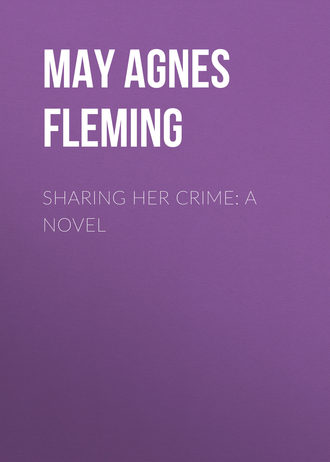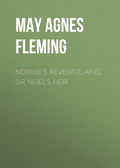
May Agnes Fleming
Sharing Her Crime: A Novel
"Oh, heart, awaken! – wrecked on lone shore,
Thou art forsaken! – dream, heart, no more!"
Gipsy stood still in the porch, cold and pale, awaiting his return. But though she waited until the stars grew dim in the sky, he came not. Morning dawned, and found her pale with undefined fear, but still he was absent.
After breakfast, Archie came over, still angry and sullen, after the previous night's scene, to find Gipsy quieter and more gentle than he had ever seen her before in her life.
"I wish he would come! I wish he would come!" cried her wild, excited heart, as she paced up and down, until her eyes grew bright and her cheeks grew burning hot, with feverish watching and vague fear.
"You look ill and excited, Gipsy. A canter over the hills will do you good," said Archie, anxiously.
She eagerly assented, and leaping on Mignonne's back, dashed away at a tremendous pace, yet could not go half quick enough to satisfy her restless longing to fly, fly, she knew not where.
"Where are you going, Gipsy?" cried Archie, who found some difficulty to keep up with the break-neck pace at which she rode.
"To the Black Gorge," was her reply, as she thundered over the cliff.
"Why, Gipsy! what possesses you to go to that wild place?" said Archie, in surprise.
"I don't know – I feel as if I must go there! Don't talk to me, Archie! I believe I'm crazy this morning!"
She flew on swifter than ever, until they reached the spot – a huge, black, yawning gulf among the hills. She rode so close to the fearful brink that Archie's heart stood still in horror.
"Are you mad, Gipsy?" he cried, seizing her bridle-rein and forcing her back. "One false step, and your brains would be dashed out against the rocks."
But, fixing her eyes on the dark chasm, she answered him only by a wild, prolonged shriek, so full of piercing anguish that his blood seemed curdling in his veins, while, with bloodless face and quivering finger, she pointed to the gulf.
He leaped from his horse and approached the dizzy edge. And there a sight met his eyes that froze his heart with horror.
"Great God!" he cried, springing back, with a face deadly white. "A horse and rider lie dead and mangled below!"
A deadly faintness came over Gipsy; the ground seemed reeling around her, and countless stars danced before her eyes. For a moment she was on the verge of swooning, then by a powerful effort the tide of life rolled back, and she leaped from her horse and stood by his side.
"It is impossible to reach the bottom," cried Archie, in a voice low with horror. "A cat could hardly clamber down those perpendicular sides."
"I can do it, Archie; I often went up and down there when a child," exclaimed Gipsy; and ere Archie could restrain her, the fearless girl had caught hold of a stunted spruce tree and swung herself over the edge of the appalling gorge.
Archie Rivers scarcely breathed; he felt as though he scarcely lived while she rapidly descended by catching the matted shrubs growing along its sides. She was down at last, and bending over the mangled form below.
"Gipsy! Gipsy! do you recognize him?" cried Archie.
She looked up, and he saw a face from which every trace of life seemed to have fled.
"Yes," she replied, hoarsely. "It is Danvers! Ride – ride for your life to Sunset Hall, and bring men and ropes to take him up!"
In an instant he was in the saddle, and off. In less than an hour he returned, with half the population in the village after him, whom the news of the catastrophe had brought together.
Ropes were lowered to Gipsy, who still remained where Archie had left her, and the lifeless form of the young man drawn up. Gipsy, refusing all aid, clambered up the side, and the mournful cavalcade set out for Sunset Hall.
He was quite dead. It was evident he had fallen, in the darkness, into the gorge, and been instantly killed. His fair hair hung, clotted with blood, round his forehead: and a fearful gash in the temple showed the wound whence his young life had flowed away. And Gipsy, feeling as though she were his murderess, sat by his side, and, gazing on the still, cold form, shed the first bitter tears that had ever fallen from her eyes. By some strange coincidence, it was in that self-same spot the dead body of Barry Oranmore had been found.
Poor Gipsy! The sunshine was fast fading out of her sky, and the clouds of fate gathering thick and fast around her. She wept now for another – knowing not how soon she was to weep for herself.
CHAPTER XXI.
THE SPIDER WEAVES HIS WEB
"A fearful sign stands in thy house of life —
An enemy – a fiend lurks close behind
The radiance of thy planet. Oh, be warned!"
– Coleridge.
"And now a darker hour ascends." – Marmion.
week after the event recorded in the last chapter Archie went back to the city. Before he went, he had obtained a promise from Gipsy – who had grown strangely still and gentle since the death of Danvers – to become his wife immediately upon his return; but, with her usual eccentricity, she refused to allow him to make their engagement public.
"Time enough by and by," was still her answer; and Archie was forced to be content.
Gipsy was, for a while, sad and quiet, but both were foreign to her character; and, with the natural buoyancy of youth, she shook off her gloom, and soon once more her merry laugh made music through the old house.
Doctor Nicholas Wiseman sometimes made his appearance at Sunset Hall of late. Lizzie was suffering from a low fever; and as he was the only physician in St. Mark's, he was called in.
As he sat one day in the parlor at luncheon with the squire, Gipsy came tripping along with her usual elastic step, and touching her hat gallantly to the gentlemen, ran up to her own room. The squire's eyes followed her with a look of fond pride.
"Did you ever see such another charming little vixen?" he asked, turning to the doctor.
"Miss Gower's certainly an extraordinary young lady," said the doctor, dryly. "I have often been surprised, Squire Erliston, that you should treat your housekeeper's niece as one of your own family."
"She's not my housekeeper's niece," blurted out the squire; "she was – "
He paused, suddenly recollecting that the discovery of Gipsy was a secret.
"She was what?" said the doctor, fixing his keen eyes on the old man's face.
"Well, hang it, Wiseman, I suppose it makes no difference whether I tell you or not. Gipsy is not Mrs. Gower's niece: she is a foundling."
"Yes," said the doctor, pricking up his ears.
"Yes, last Christmas Eve, just seventeen years ago, Mrs. Gower, returning from A – , found Gipsy lying on the beach, near the south end of the city."
Long habit had given Dr. Wiseman full control over his emotions, but now the blood rushed in a purple tide to his sallow face, as he leaped from his chair and fairly shouted:
"What!"
"Eh? Lord bless the man! – what's the matter?" said the squire, staring at him until his little fat eyes seemed ready to burst from their sockets.
"What did you say? – found her on the beach on Christmas Eve, seventeen years ago?" said the doctor, seizing him fiercely by the arm, and glaring upon him with his yellow eyes.
"Yes, I said so. What in the name of all the demons is the matter with you?" roared the squire, shaking him off. "What do you know about it?"
"Nothing! nothing! nothing!" replied the doctor, remembering himself, and sinking back in his chair. "Pray, go on."
The squire eyed him suspiciously.
"My dear sir," said the doctor, every trace of emotion now passed away, "forgive my violence. But, really, the story seemed so improbable – "
"Improbable or not, sir," interrupted the squire, angry at being doubted, "it's true as Gospel. It was a snowy, unpleasant night. Mrs. Gower and Jupiter were returning from the city, and took the shore road in preference to going over the hills. As they went along, Mrs. Gower was forced to get out on account of the dangerous road; and hearing a child cry, she stooped down, and found Gipsy lying wrapped up in a shawl, in the sand. Well, sir, my housekeeper, as a matter of course – being a humane woman – brought the child (which could not have been a week old) home, and gave it her name. And that, sir, is the history of Gipsy Gower, let it seem ever so improbable."
Like lightning there flashed across the mind of the doctor the recollection of the advancing sleigh-bells which had startled him from the beach. This, then, was the secret of her disappearance! This, then, was the child of Esther Erliston and Alfred Oranmore! This wild, untamed, daring elf was the heiress, in her mother's right, of all the broad lands of the Erlistons. She had been brought up as a dependent in the house of which she was the rightful heiress: and the squire dreamed not that his "monkey" was his grandchild!
Thoughts like these flashed like lightning through the mind of Dr. Wiseman. The sudden, startling discovery bewildered him; he felt unequal to the task of conversing. And making some excuse, he arose abruptly, entered his gig, and letting the reins fall on his horse's neck, allowed him to make the best of his way home; while, with his head dropped on his breast, he pondered on the strange disclosure he had just heard.
No one living, it was evident, knew who she was, save himself. What would old Dame Oranmore say when she heard it? Wretch as he was, he found himself forced to acknowledge the hand of a ruling Providence in all this. The child who had been cast out to die had been nurtured in the home that was hers by right. By his hand the mother had perished; yet the heroism of the daughter had preserved his worthless life.
"What use shall I make of this discovery?" he mused, as he rode along. "How can I turn it to my own advantage? If I wish it, I can find little difficulty in convincing the world that she is the rightful heiress of Mount Sunset, instead of Louis Oranmore. But how to do it, without implicating myself – that's the question. There was no witness to the death-bed scene of Esther Erliston; and I can assert that Madam Oranmore caused me to remove the child, without mentioning the mother at all. I can also easily feign some excuse for leaving her in the snow – talk about my remorse and anguish at finding her gone, and all that. Now, if I could only get this hare-brained girl securely in my power, in such a way as to make her money the price of her freedom, I would not hesitate one moment about proclaiming it all. But how to get her in my power – she is keen and wide-awake, with all her madness, and not half so easily duped as most girls of her age. Let me think!"
His head fell lower, his claw-like hands opened and shut as though clutching some one, his brows knit in a hard knot, and his eyes seemed burning holes in the ground, with their wicked, immovable gaze.
At last, his mind seemed to be made up. Lifting his head, he said, with calm, grim determination:
"Yes, my mind is made up; that – girl – shall – be – my – WIFE!"
Again he paused. His project, when repeated aloud, seemed so impossible to accomplish that it almost startled him.
"It may be difficult to bring about," he said, as if in answer to his momentary hesitation. "No doubt it will; but, nevertheless, it shall, it will, it must be done! Once her husband, and I shall have a legal right to everything she possesses. The world need not know I have made the discovery until after our marriage; it shall think it is for love I marry her. Love! – ha, ha, ha! Just fancy Dr. Wiseman, at the age of fifty-nine, falling in love with a chit of a girl of seventeen! Well, I shall set my wits to work; and if I fail to accomplish it, it will be the first time I have ever failed in aught I have undertaken. She calls me a spider; let her take care lest she be caught – lest her bright wings are imprisoned in the web I will weave. Her opposition will be fierce and firm; and, if I have studied her aright, she can only be conquered through those she loves. That she loves that whipper-snapper of a nephew of mine, I have long known; and yet that very love shall make her become my wife. And so my bright little Gipsy Gower – or Gipsy Oranmore – from this day forth you are mine!"
"Look here, aunty," said Gipsy, following Mrs. Gower, as she wandered through the house, brush in hand, "what brings that old spider here so often of late? He and Guardy appear to be as thick as two pickpockets – though, a few years ago, Guardy detested the sight of him. They are for everlasting closeted together, plotting something. Now, aunty, it looks suspicious, don't it?"
"I am afraid Dr. Wiseman is drawing your guardian into some rash speculation," said Mrs. Gower. "The squire is always muttering about 'stocks,' and 'interest,' and such things. I am afraid the doctor is using him for his own purposes. Heaven forgive me if I wrong him!"
"Wrong him! I tell you, aunty, that Spider's a regular snake. I wouldn't trust him as far as I could see him. He has a way of looking at me that I don't half like. Whenever I'm in the room he stares and stares at me, as if I were some natural curiosity. Perhaps he's falling in love with me. There! I tell you what, aunty – I've just hit the right thing in the middle – he's meditating whether or not he'll raise me to the dignity of Mrs. Spider Wiseman – I know he is!" exclaimed Gipsy, laughing, little dreaming how near she had stumbled to the truth.
"Nonsense, child. A man of Dr. Wiseman's age and habits has little thought of taking a wife, much less such a wild one as you. I hope it may all turn out well, though I have my doubts."
"So have I," said Gipsy; "and I'm going to keep a bright lookout for breakers ahead. If that yellow old ogre tries to bamboozle poor, dear, simple Guardy, he'll find himself in a worse scrape than when I saved him from drowning. I know I was born to be a knight-errant, and protect innocent old men, and astonish the world generally. And now I must run up stairs, and see if I can do anything for poor little Aunt Liz."
While Gipsy was conversing with Mrs. Gower, a dialogue of a different nature was going on in the parlor betwixt the squire and the doctor.
Artfully had Dr. Wiseman's plans been laid, and skillfully were they executed. With his oily, persuasive words, and flattering tongue, he had got the squire completely and irrecoverably in his power, in order that the hand of his ward might be the price of his freedom.
Dr. Wiseman knew the squire always had a mania for speculating. Taking advantage of this, he entrapped him into investing in some mad scheme, which failed, as the doctor well knew it would, leaving the squire hopelessly in debt. Of all his creditors he owed the doctor himself the most; for that obliging man had insisted on lending him large sums of ready money. And now the time of payment was at hand, and where should he obtain the money?
Squire Erliston was rich – that is, the estate of Mount Sunset was in itself a princely fortune; but this was to descend to his grandson; and the squire had too much pride to allow it to go to him burdened with debt. Neither could he mortgage any part of it to pay off the debt. He felt that his heir ought not to suffer for his own madness. Besides, he did not wish his grandson to know how egregiously he had allowed himself to be duped by a set of sharpers. Therefore he now sat listening to the doctor, half-stupefied at learning the extent of his losses – the amount of debts which he had no means of paying; while the doctor condoled with him outwardly, and chuckled inwardly at the success of his plans.
"Moore, to whom you are indebted to the amount of twenty thousand dollars, even goes so far as to threaten law proceedings if he is not immediately paid," said the doctor, continuing the conversation.
The squire groaned.
"I told him it might not be convenient for you to meet so many heavy liabilities at once; but he would not listen to reason – said he would give you a week to deliberate, and if at the end of that time the money was not forthcoming, your rascality, as he termed it, should be openly proclaimed to the world, and the law would force you to pay."
"Oh, Lord!" said the squire, writhing inwardly.
"His intention, without doubt, is to obtain a claim on Mount Sunset; and, your other creditors joining him, the whole estate will finally become theirs."
"Never!" shouted the squire, leaping fiercely to his feet. "I will shoot every villain among them first! Mount Sunset has been in our family for years, and no gang of swindlers shall ever possess it."
"My dear sir," said the doctor, soothingly, "do not be excited. It is useless, and will only make matters worse. You see you are completely in their power, and there is no possible hope of escape. In spite of all you can do, I fear Mount Sunset will be theirs, and you and your family will be turned out upon the world, comparatively speaking, beggars."
The unhappy squire sank back in his chair; and, covering his face with his hands, writhed and groaned in mental torture.
"Your only course now," continued the merciless doctor, fixing his snake-like eyes with lurking triumph on his victim, "is to write to your grandson, confess all to him, and bring him home. He is an artist of some note, they say. Most probably, therefore, he will be able to support you – though it may seem strange to him first to work for his living."
"Work for his living!" shouted the squire, maddened by the words. "Louis Oranmore work for his living! No, sir! he has not sunk so low as that yet. If need be, he has the property of his grandmother Oranmore still remaining."
"The property of Mrs. Oranmore will not be his until her death, which may not be this ten years yet. She is hard and penurious, and would hardly give him a guinea to keep him from starving. Besides, would you, Squire Erliston, live on the bounty of Mrs. Oranmore?" said the doctor, with a sarcastic sneer.
"No, sir; I would die of starvation first!" replied the squire, almost fiercely. "But she, or some one else, might lend me the money to pay off these accursed debts."
"Not on such security as you would give, Squire Erliston," said the doctor, calmly. "In fact, my dear sir, it is useless to think of escaping your fate. Mount Sunset must be given up to satisfy these men!"
"Oh, fool! fool! fool! – miserable old fool that I was, to allow myself to be so wretchedly duped!" groaned the squire, in bitter anguish and remorse. "Better for me had I never been born, than that such disgrace should be mine in my old age! And Louis! – poor Louis! But I will never see him again. If Mount Sunset be taken from me it will break my heart. Every tree and picture about the old place is hallowed by the memory of the past; and now that I should lose it through my own blind, miserable folly! Oh! woe is me!" And, burying his great head in his hands, the unhappy old man actually sobbed outright.
Now had the hour of Dr. Wiseman's triumph come; now was the time to make his daring proposal. Awhile he sat gloating over the agonies of his victim; and then, in slow, deliberate tones, he said:
"But in all this darkness, Squire Erliston, there still remains one ray of light —one solitary hope. What would you do if I were to offer to cancel what you owe me, to pay off all your other debts, and free you once more?"
"Do!" exclaimed the squire, leaping in his excitement from the chair. "Do, did you say? I tell you, Dr. Wiseman, there is nothing under heaven I would not do. But you – you only mock me by these words."
"I do not, Squire Erliston. On one condition your debts shall every one be paid, and Mount Sunset still remain yours."
"And that condition! For Heaven's sake name it!" cried the squire, half maddened by excitement.
"Will you agree to it?"
"Yes, though you should even ask my life!"
"That would be of little service to me," said the doctor, with a dry smile. "No; I ask something much easier."
"For Heaven's sake name it!" exclaimed the squire, wildly.
"It is – "
"What?"
"The hand of your ward, Gipsy Gower."
The squire stood like one transfixed with amazement, his eyes ready to shoot from his head with surprise and consternation. And calmly before him sat the doctor, his leathern countenance as expressionless as ever.
"What did you say?" said the squire, at length, as though doubting the evidence of his senses.
"My words were plainly spoken. I will free you from all your debts on condition that you bestow upon me in marriage the hand of your young ward, Gipsy Gower."
"But – Lord bless me! my dear sir, what in the world can you want with that chit of a child – that mad girl of the mountains – for a wife?" exclaimed the squire, still aghast.
"I want her, let that suffice," said the doctor, with a frown. "Do you agree to this proposal?"
"Why, I'm willing enough, but she– oh, Dr. Wiseman, the thing is hopeless – she'd never consent in this world. She can be as obstinate as a little mule when she likes. 'When a woman won't, she won't, and there's the end on't,' as Solomon says."
"You must make her."
"Me! Why, she doesn't mind me– "
"Squire Erliston," angrily broke in the doctor, "listen to me; either you lose Mount Sunset and are publicly disgraced, or you will compel this girl to marry me. Do you hear?"
"There! there! don't be hasty! I'll do what I can. It won't be my fault if she don't. But who'd ever think of you wanting to marry little Gipsy. Well, well, well, 'Wonders will never cease,' as Solomon says."
"You can explain the matter to her – urge her by her gratitude, her love for you, to consent," said the doctor; "try the sentimental dodge – commands in this case will be worse than useless. Enlist the women on your side; and above all things keep it a profound secret from Archibald Rivers and Louis Oranmore. If none of your arguments move her, I have still another in reserve that I know will clinch the business. Give her no rest, day or night, until she consents; and if she complains of cruelty, and all that, don't mind her. All girls are silly; and she, being half-crazy, as she is, it seems to me the greatest favor you can do her is to marry her to a man of sense and experience like myself. Keep in mind what you lose by her refusal, and what you gain by her consent. If she will not marry me, I will add my claims to those of your other creditors, and no earthly power will be able to save you from total ruin," said the doctor, with grim, iron determination.
"She shall consent! she shall – she must!" said the squire, startled by his last threat; "she shall be your wife, that is settled. I think I can manage her, though it will be a desperate struggle."
"I shall force myself into her presence as little as possible," said the doctor, calmly; "she has no particular love for me as yet, and it will not help on my case. Mind, I shall expect you will use all your energies, for our marriage must take place in a month at farthest," said the doctor, as he arose, and, with a last expressive glance at his victim, withdrew.







